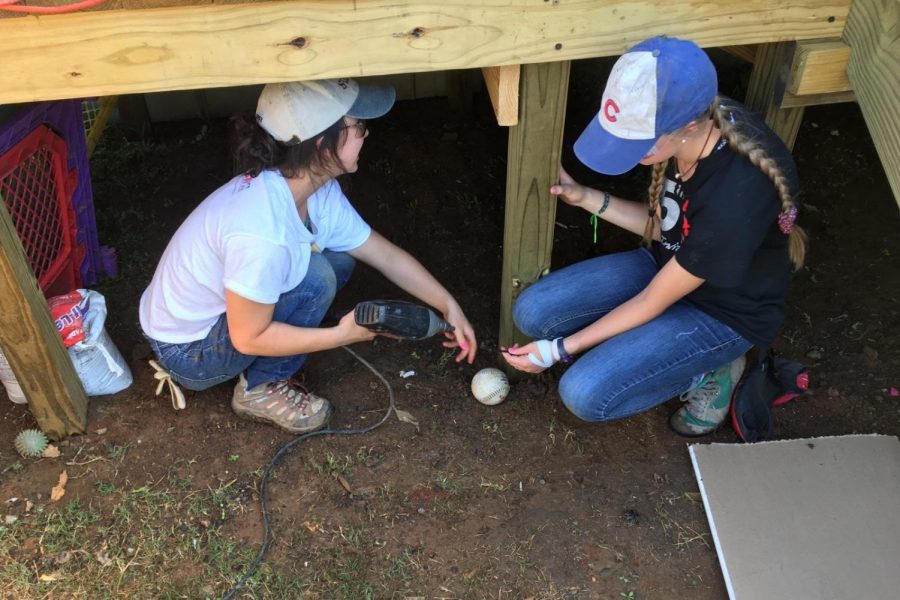On service trips, sensitivity matters
Holly Adams (right) and a friend repair a house during an Appalachia Service Project trip. Though ASP emphasizes community over tourism, many other “voluntourism” organizations don’t address real, existing problems. Photo courtesy Holly Adams.
June 11, 2019
On a service trip with my church youth group in Tennessee last summer, I met three toddlers, two rabbits, one chihuahua named Taffy and a chicken named Jack while we repaired homes for low-income families. I didn’t know about all of the animals I would grow close with. I didn’t know about all the new perspectives I would gain. I certainly didn’t know that, for the first and probably last time, I would have to rescue a chihuahua who got trapped in a chicken cage. Don’t be alarmed though, the kids who lived on the property were more than equipped to handle the ensuing chicken-dog face-off.
According to NPR, over 1.6 million volunteer tourists spend about $2 billion each year on volunteer opportunities abroad. While it’s admirable that people have the desire to do community service, often times western volunteers go on service trips with a superiority complex, believing that they’re going to “save” and “bring civility” to developing countries; the trouble with this is, we’re volunteering for cute Instagram posts or to bolster our resumes rather than genuinely wanting to help.
Voluntourism—the practice where participants spend time working in developing communities while immersing themselves in the culture—is growing in popularity. Common forms of voluntourism include teaching English in impoverished countries, building schools and volunteering at orphanages.
While exposure to life outside of the Bethesda bubble can help broaden our understanding of the world, volunteers need to keep in mind that they’re going to work alongside the community they’re helping, rather than fixing problems for them. Volunteers won’t eradicate poverty or fix a systematic issue in the few weeks that they’re spending in an area, but rather try to make a small difference and learn about different communities and cultures. When looking for an organization to travel with, it’s important to make sure that it’s a nonprofit that aims to work with communities on addressing actual, existing problems.
Some organizations exaggerate or even fabricate issues for volunteers to “fix.” According to Tourism Concern, an organization that promotes ethical tourism, corrupt companies developed an entire orphanage industry in Bali and Cambodia, where volunteers tourists can “make an impact” through providing children with shelter and guidance. In reality, many of the kids in these “orphanages” aren’t actually orphans—they left home seeking the care of voluntourists. Within many unregulated orphanages, the ‘orphans’ are at risk of neglect, and physical and sexual assault.
Appalachia Service Project, the organization that I went to Tennessee with, has a slogan: “relationships with construction on the side.” Rather than focusing on tourism or “fixing” different communities, the organization focuses on helping local residents and forming relationships with community members. In between sleeping in elementary school gyms, we go to community events; we’ve watched a soul band perform, and we’ve gone to an open-mic night at a local ice cream shop. My church fundraises for the trip all year, and when summer rolls around, we travel in church vans and eat at Cracker Barrels.
Don’t get me wrong, there are plenty of organizations that do incredible work for under-resourced areas and prioritize cultural sensitivity. Other than ASP, the Manos Unidas club has trips to Ecuador and Peru that are more of cultural exchanges than service trips. The Peace Corps also makes sure to respect the culture of the communities they’re going into above all else.
We have to make sure that the organizations we volunteer for will actually make sustainable, positive changes to communities. While there will almost certainly be some bumps in the road, like having to rescue a chihuahua from a chicken cage, the experience will genuinely change your life.










